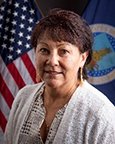May 3, 2022
May marks Mental Health Awareness Month. Some may be surprised to know that it has been recognized since 1949. It began as a way to inform and educate the public about mental illness, raise awareness about conditions and treatments, reduce stigmas, and celebrate recovery.
We need to remember that people often suffer in silence and don’t seek treatment for their conditions. Mental health awareness is an important initiative to increase access to professional care for those who need it.
Our agency and USDA support employees seeking to address mental health and stress concerns and equip all employees to recognize warning signs in others. I recently spoke with Uretha Bostic, USDA Work-Life Program Manager about this recognition month and support resources available.
Marcia: Thank you for taking time to talk and share important information. Year round we need to have awareness and support those who may be in a vulnerable place.
Uretha: I think it is extremely important to recognize mental health because it is critical to an individual’s well-being at work and in life. Every employee plays a vital role in creating a positive work environment, understanding what it means to be mentally healthy, and supporting those who may be facing challenges. People often struggle silently, and many are in need. They are our family members, may live next door, possibly teach your children, work in our section, sitting in the same church pew, or perhaps the one in the mirror. However, only half of those affected receive treatment, often because of the stigma attached to mental health. Untreated, mental illness can contribute to higher medical expenses, poorer performance at school and work, fewer employment opportunities and increased risk of suicide.
Marcia: It’s unfortunate to hear about those struggles. What can we do individually or collectively to address such barriers?
Uretha: Although the general perception of mental illness has improved, it is still out there and the stigma against mental illness is very powerful, largely due to media stereotypes and lack of education. That stigma affects not only the number seeking treatment, but also the number of resources available for proper treatment. Stigma and misinformation can feel like overwhelming obstacles for someone who is struggling with a mental health condition. Here a few powerful things you can do to help:
- Showing individuals respect and acceptance to remove a significant barrier to successfully coping with their condition/illness. Having people see you as an individual and not as your illness can make the biggest difference for someone who is struggling with their mental health.
- Become an advocate within your circles of influence to help ensure the same rights and opportunities exists for them.
- Learn more about mental health so that you can become a distribution center of knowledge to provide helpful support to those affected in our families and communities.

Uretha Bostic, FPAC Work-Life Program Manager
Marcia: Sadly, suicide is major threat, especially when people feel at their most vulnerable, what resources are out there to help people identify signs of danger in others?
Uretha: Individuals with deteriorating mental health may exhibit changes in their mood, interactions, or performance at work and may need help. With suicide receiving more visibility in the media, we'd like to share some information published by the Centers for Disease Control and Prevention (CDC) on the prevalence of suicide in our nation, recommendations for prevention, and national resources that are available in addition to your EAP. In addition, the below fact sheets and other resources aren’t far away.
I am grateful for the information that Uretha shared, and I hope you all will take a moment to think about mental health for ourselves and others. Not all wounds are visible to the eye; we need to care as much about mental health as we do physical wellbeing.
– Marcia
Additional Resources:
Mental Health
Post Traumatic Stress Disorder (PTSD)

Marcia Bunger is the Administrator of USDA’s Risk Management Agency (RMA). Prior to her appointment, she served as a County Executive Director for USDA’s Farm Service Agency. A native South Dakotan, Bunger is also the owner and operator of a 2000-acre farm, a cum laude graduate of Augustana College, and the first member of the Asian American and Pacific Islander community and first woman to serve as RMA Administrator.
